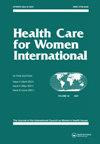未满足的避孕需求是印度尼西亚意外怀孕的风险。
IF 0.9
4区 医学
Q4 PUBLIC, ENVIRONMENTAL & OCCUPATIONAL HEALTH
引用次数: 0
摘要
在低收入和中等收入国家,意外怀孕是一种众所周知的社会和经济负担。因此,我们的目的是通过使用2017年印度尼西亚人口与健康调查(IDHS)的横断面研究来检查未满足的避孕需求是否会导致印度尼西亚的意外怀孕。在双变量分析中,我们选择了除就业状况外的所有变量进行模型构建。在多变量分析中,我们发现未满足避孕需求的人意外怀孕的风险比满足需求的人高1.3倍(CI 1.16-1.47)。关注未满足的避孕需求可以减少意外怀孕的发生率。本文章由计算机程序翻译,如有差异,请以英文原文为准。
Unmet contraceptive needs as the risk for unintended pregnancies in Indonesia.
Unintended pregnancies are widely known as social and financial burdens in low and middle-income countries (LMICs). Therefore, we aim to examine whether unmet contraceptive needs cause unintended pregnancies in Indonesia in a cross-sectional study using the 2017 Indonesia Demographic and Health Survey (IDHS). In the bivariate analysis, we selected all variables for model building, except for employment status. In multivariate analysis, we found that unmet contraceptive needs posed a 1.3-fold higher risk for unintended pregnancies (CI 1.16-1.47) than those with met needs. Focusing on unmet contraceptive needs could reduce the prevalence of unintended pregnancies.
求助全文
通过发布文献求助,成功后即可免费获取论文全文。
去求助
来源期刊

Health Care for Women International
Multiple-
CiteScore
3.30
自引率
7.10%
发文量
91
期刊介绍:
Health Care for Women International is a critically acclaimed, international publication that provides a unique interdisciplinary approach to health care and related topics that concern women around the globe. Published twelve times a year, Health Care for Women International includes the newest research, theories, and issues in the fields of public health, social science, health care practice, and health care policy. Scholars and practitioners address topics such as cultural differences, alternative lifestyles, domestic violence, public health issues associated with the aging of the population, maternal morbidity and mortality, infectious diseases, and a host of other gender-based ethical issues. The editor also encourages discussion topics, inviting readers to comment on articles that focus on specific aspects of health issue for women.
 求助内容:
求助内容: 应助结果提醒方式:
应助结果提醒方式:


